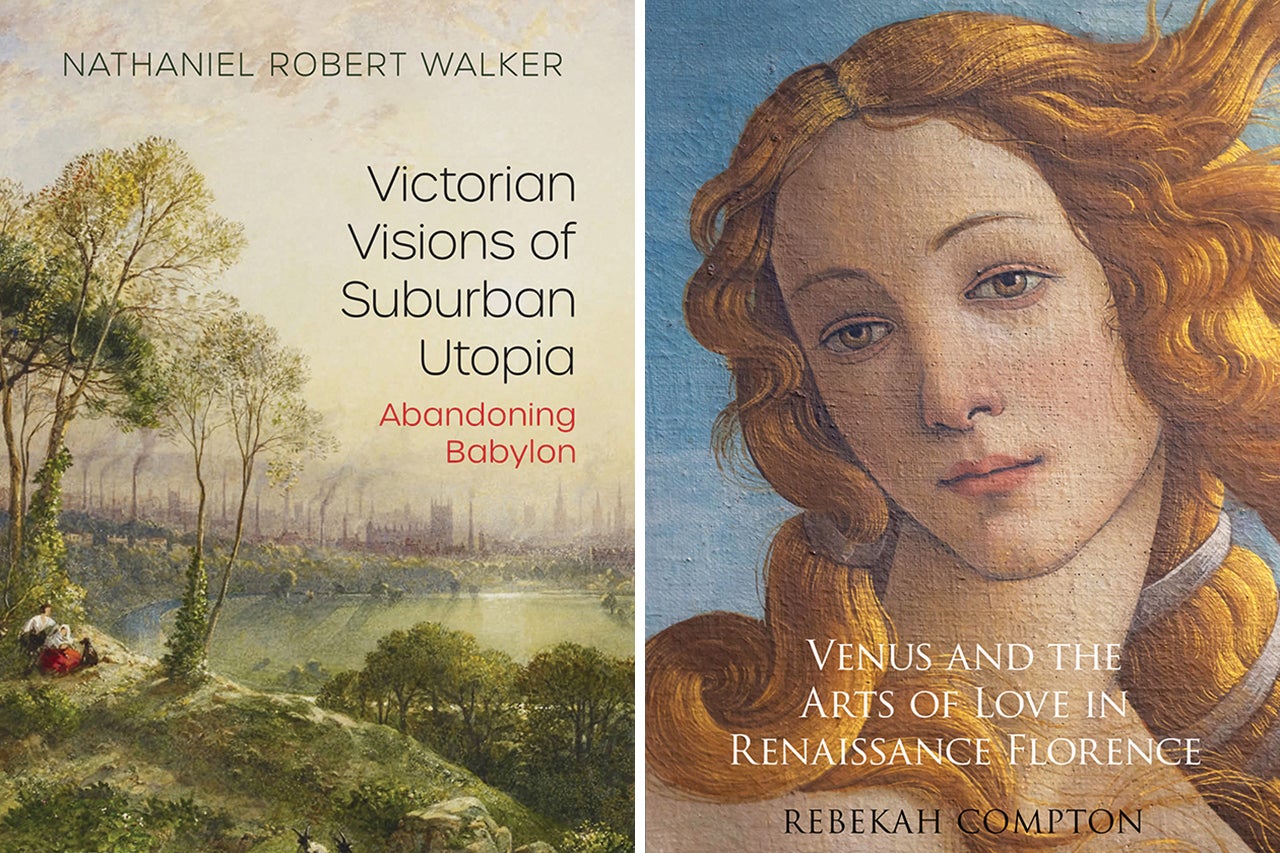CofC faculty are experts in their fields, as this roundup of new books written by them attests.
 Rebekah Compton, associate professor of Renaissance and Baroque art – Venus and the Arts of Love in Renaissance Florence (Cambridge University Press) offers the first survey of Venus in the art, culture and governance of Florence from 1300 to 1600. Organized chronologically, each of the six chapters investigates one of the goddess’ alluring attributes, revealing the materials and techniques employed by artists, patrons, rulers and lovers to manifest Venusian virtues. Compton’s book explores technical art history in the context of love’s protean iconography, showing how different discourses and disciplines can interact in the creation and reception of art. Her book offers new insights on sight, seduction and desire in the early modern era.
Rebekah Compton, associate professor of Renaissance and Baroque art – Venus and the Arts of Love in Renaissance Florence (Cambridge University Press) offers the first survey of Venus in the art, culture and governance of Florence from 1300 to 1600. Organized chronologically, each of the six chapters investigates one of the goddess’ alluring attributes, revealing the materials and techniques employed by artists, patrons, rulers and lovers to manifest Venusian virtues. Compton’s book explores technical art history in the context of love’s protean iconography, showing how different discourses and disciplines can interact in the creation and reception of art. Her book offers new insights on sight, seduction and desire in the early modern era.
 Scott Peeples, English professor – The Man of the Crowd: Edgar Allan Poe and the City (Princeton University Press) chronicles Poe’s rootless life in the cities, neighborhoods and rooms where he lived and worked, exploring how each place left its mark on the writer and his craft. Featuring evocative photographs by retired CofC studio art professor Michelle Van Parys, the book challenges the misconception of Poe as an isolated artist living in a world of his own imagination, detached from his physical surroundings.
Scott Peeples, English professor – The Man of the Crowd: Edgar Allan Poe and the City (Princeton University Press) chronicles Poe’s rootless life in the cities, neighborhoods and rooms where he lived and worked, exploring how each place left its mark on the writer and his craft. Featuring evocative photographs by retired CofC studio art professor Michelle Van Parys, the book challenges the misconception of Poe as an isolated artist living in a world of his own imagination, detached from his physical surroundings.
 Alison Piepmeier, the late women’s and gender studies professor – Unexpected: Parenting, Prenatal Testing, and Down Syndrome (NYU Press) paints an intimate, nuanced picture of reproductive choice in today’s world. Before she passed away in 2016, Piepmeier asked friends and colleagues George Estreich and Rachel Adams to complete her unfinished manuscript, which takes us inside Piepmeier’s own daughter’s life, showing how Down syndrome is misunderstood, stigmatized and condemned, particularly in the context of prenatal testing.
Alison Piepmeier, the late women’s and gender studies professor – Unexpected: Parenting, Prenatal Testing, and Down Syndrome (NYU Press) paints an intimate, nuanced picture of reproductive choice in today’s world. Before she passed away in 2016, Piepmeier asked friends and colleagues George Estreich and Rachel Adams to complete her unfinished manuscript, which takes us inside Piepmeier’s own daughter’s life, showing how Down syndrome is misunderstood, stigmatized and condemned, particularly in the context of prenatal testing.
 Nathaniel Robert Walker, associate professor of architectural history – Victorian Visions of Suburban Utopia: Abandoning Babylon (Oxford University Press) explores unknown visions of urban reform in Victorian utopian socialist and science-fiction literature, revealing a consistent call for the destruction of cities and a longing for the creation of suburban landscapes. The book offers fresh new analyses of famous figures of literature and design, such as Edward Bulwer-Lytton, Edward Bellamy, William Morris, Ebenezer Howard and H.G. Wells, situating them in context with each other and the discourses in which they operated.
Nathaniel Robert Walker, associate professor of architectural history – Victorian Visions of Suburban Utopia: Abandoning Babylon (Oxford University Press) explores unknown visions of urban reform in Victorian utopian socialist and science-fiction literature, revealing a consistent call for the destruction of cities and a longing for the creation of suburban landscapes. The book offers fresh new analyses of famous figures of literature and design, such as Edward Bulwer-Lytton, Edward Bellamy, William Morris, Ebenezer Howard and H.G. Wells, situating them in context with each other and the discourses in which they operated.
 Barry L. Stiefel (co-author), associate professor of historic preservation and community planning – The Routledge Companion to Automobile Heritage, Culture, and Preservation (CRC Press) explores automotive heritage, its place in society and the ways we might preserve and conserve it. The book helps to shape how we think about automobile heritage and considers how that heritage explores a range of cultural, intellectual, emotional and material elements well outside of the automobile body itself. Most importantly, perhaps, it questions how we might better acknowledge the importance of automotive heritage now and in the future.
Barry L. Stiefel (co-author), associate professor of historic preservation and community planning – The Routledge Companion to Automobile Heritage, Culture, and Preservation (CRC Press) explores automotive heritage, its place in society and the ways we might preserve and conserve it. The book helps to shape how we think about automobile heritage and considers how that heritage explores a range of cultural, intellectual, emotional and material elements well outside of the automobile body itself. Most importantly, perhaps, it questions how we might better acknowledge the importance of automotive heritage now and in the future.




